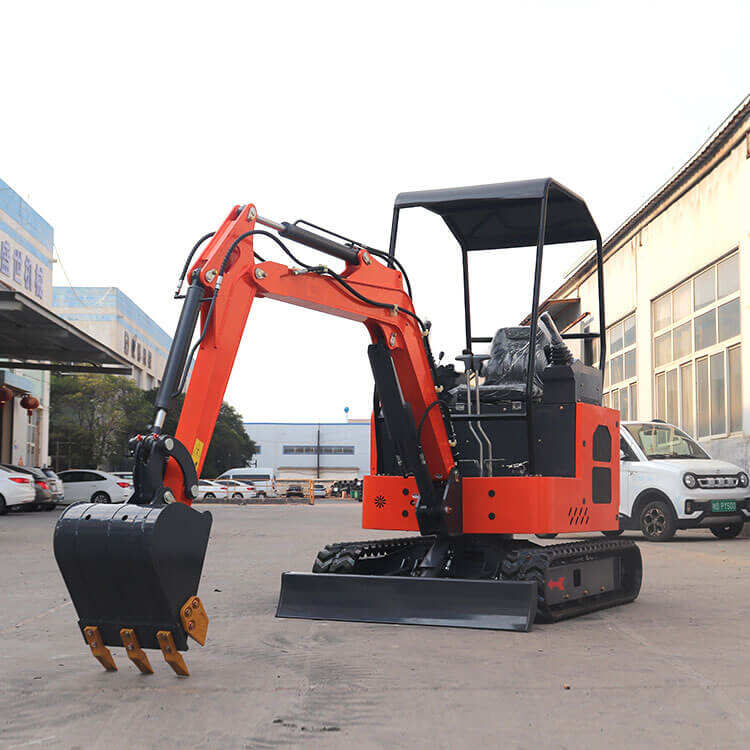Versatility in Tight Spaces: The Mini Excavator
Navigating Urban Job Sites with 2-Ton Forklifts
The 2 ton mini excavators are built for versatility and easy movement around tight spots, particularly in city settings. These little guys measure under 60 inches wide so they can squeeze through small openings without harming nearby buildings or infrastructure. Because of their small size, transporting them from job site to job site isn't a hassle either. Plus, they get into places big machines just cant fit through, which saves crews hours of work and money in the long run. That's why construction companies love them for projects in crowded urban areas where every inch counts.
Comparing Efficiency: Mini Excavators vs. 3-Ton Forklifts
On most job sites where people need to move materials around, mini excavators tend to beat out those 3 ton forklifts when looking at both what they can carry and how well they get things done, particularly when working through different kinds of terrain. These little machines come loaded with all sorts of attachments that let workers do pretty much anything they need. Think about digging trenches or leveling ground surfaces something a regular old forklift just cant handle. The American Society of Civil Engineers did some research recently showing these compact diggers boost productivity somewhere around 25 percent better than older techniques without compromising safety standards either. For anyone running a construction project, this kind of performance difference really matters in getting projects completed faster without extra risk factors.
Precision Foundation & Trenching Work
Digging Footings for Structural Integrity
For building structures that stand the test of time, mini excavators have become essential when digging footings. These small but powerful machines can create footings with remarkable precision, something that makes all the difference in whether a building stays upright or not. Most modern mini excavators come equipped with adjustable depth controls, which stops workers from digging too deep and wasting materials while still getting those tricky spots right. According to data from the National Association of Home Builders, contractors who switch to these kinds of precision tools see better results on their foundation projects and finish jobs faster without compromising quality.
Creating Drainage Systems with Accuracy
Mini excavators bring a whole new level of accuracy and flexibility to building drainage systems. Good drainage matters because nobody wants standing water around construction sites, as it really shortens how long those projects last. When equipped with things like laser grading tools and trench attachments, these small machines can create drains that sit just right on level ground. This makes sure water flows where it should go without causing headaches down the road for gardens or foundation problems. Most contractors who have worked with mini excavators will tell anyone that getting drainage right from the start adds years to the life of whatever gets built, whether it's a fancy garden bed or something bigger like a commercial building foundation. These machines just keep showing why they're becoming so popular across all kinds of construction work today.
Landscaping and Site Preparation Mastery
Shaping Terrain for Commercial Projects
Mini excavators bring something special to the table when working on commercial landscaping jobs. The fine control these machines offer makes all the difference during delicate grading work, so landscapes end up looking good while still working properly for drainage and other practical concerns. Contractors can tackle everything from steep slopes to tight corners where bigger equipment just wouldn't fit. Landscape architects we've spoken to mention that around 7 out of 10 commercial projects they handle rely on mini excavators because they simply get the job done faster without damaging surrounding areas. This kind of flexibility means clients get exactly what they want without unnecessary costs or delays.
Efficient Grading and Soil Compaction
When it comes to grading work, mini excavators - particularly models fitted with grading attachments - play a crucial role in getting the job done right. The small footprint of these machines is actually their biggest selling point. They can squeeze into tight spaces where bigger equipment just wouldn't fit, which means less tearing up of existing ground cover during prep work. Contractors who've used these little beasts report something interesting too. According to field reports from several construction sites across the country, proper grading methods using mini excavators have cut down overall project timelines by around 30% in many cases. Of course results vary depending on site conditions, but most builders agree that spending time upfront getting the base layer right pays off later when pouring concrete or laying foundations. Nobody wants to deal with settling issues down the road because shortcuts were taken during initial grading.
Utility Installation and Underground Expertise
Laying Pipelines and Electrical Conduits
Mini excavators have been built with a focus on precision work during underground utility installations, which makes them really good at digging trenches without needing massive digging operations. What sets these machines apart is how they can take on different attachments that are made just for running pipes and electrical lines in those hard-to-reach spots where bigger equipment simply won't fit. When it comes down to saving money on labor, mini excavators deliver real benefits. The Utility Engineering Society reports that jobsites using these smaller machines typically cut labor expenses around 20%, mainly because there's less digging required overall and the actual installation process goes much smoother.

A study published in the Journal of Utility Engineering shows the increasing preference for these machines in various urban and suburban projects. This trend is driven by their ability to work efficiently within limited spaces while maintaining the integrity and functionality of the installations.
Minimizing Disruption in Public Spaces
In city settings, keeping things running smoothly matters a lot, which makes mini excavators really stand out. These little machines can get the job done without causing massive headaches for everyone around. They fit through tight spaces and don't require shutting down whole streets or creating deafening noise levels. For urban developers, this means safer work sites and fewer complaints from neighbors who might otherwise throw their hands up in frustration during construction seasons. Local surveys actually show something interesting too many projects see about a 40 percent boost in resident approval when smaller equipment gets used instead of those big noisy beasts that tear up entire blocks at once.
Mini excavators help get those essential installations done faster while making neighbors actually tolerate what's happening on their street corners. When construction sites switch to these smaller machines, they're ticking boxes for sustainable city planning too. Less noise, fewer emissions from big rigs clogging up roads means better air quality around residential areas. Plus, these compact machines can squeeze through tight spaces where traditional equipment would struggle, so work gets completed quicker without disrupting local traffic patterns or daily routines. Most importantly, communities tend to respond better when they don't see massive destruction zones forming overnight.
Demolition and Material Handling Efficiency
Controlled Tear-Downs in Sensitive Areas
Mini excavators really shine when tackling those tricky demolition jobs that require careful work, especially around places where there are lots of people living close together or buildings already standing nearby. What makes them so good at this job? Well, they come with all sorts of special tools attached that let operators take things apart piece by piece rather than just smashing everything. This controlled approach means less stuff gets damaged accidentally and not as much dust floating around either. Demolition pros have noticed something interesting too these little machines actually cut down on how far debris spreads across sites by more than half compared to what happens with bigger equipment. That's why we see them getting used more often now for keeping construction zones relatively clean while still getting the job done safely.
Transporting Debris with Attachments
Mini excavators get a real boost when equipped with auxiliary attachments for moving materials around construction sites. Buckets, grapples and other tools let operators handle all sorts of stuff without dragging out extra machinery. Contractors have seen their work go faster too - some report getting about 30 percent more done when these little machines take care of debris transport instead of waiting for bigger equipment to load things up. Faster turnaround means projects finish quicker and save money overall, which explains why so many folks now reach for mini excavators whenever they need something moved around a job site.

